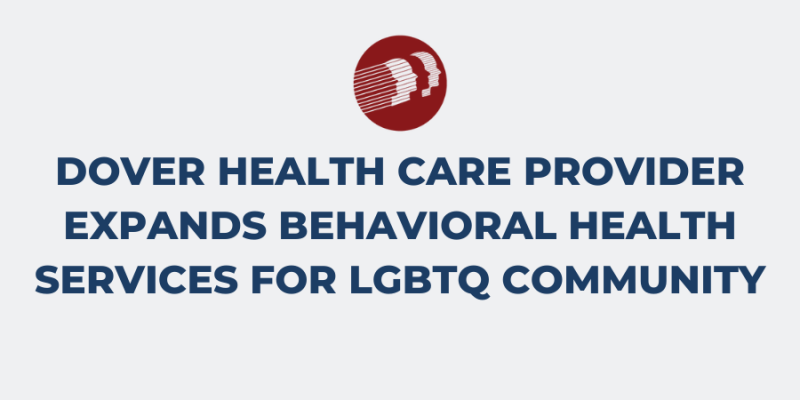
NEW CASTLE (Feb. 21, 2022) – A Dover primary care office is expanding behavioral health services for LGBTQ individuals thanks to federal grant funding. A Peaceful Place Integrated Care is using the grant to support the addition of a certified drug and alcohol counselor, a licensed clinical social worker, and a peer navigator to help treat patients with substance use disorders and co-occurring mental health issues. The funds also support the use of telehealth to help patients continue accessing treatment.
A Peaceful Place is a minority-owned, woman-owned primary care office run by Ericka Daniel, a psychiatric nurse practitioner and family nurse practitioner. Daniel decided to open a practice that focuses on the unique needs of the LGBTQ population after she completed training in transgender health and non-binary gender education and realized there are few service providers with this specialized knowledge in Delaware.
“I would go to refer patients to LGBTQ-affirming health providers and realized there were hardly any,” Daniel said. “So, I decided to start my own practice.”
Daniel’s office provides primary care and wraparound behavioral health support services. Although she accepts all patients for primary health care, she seeks to create an environment that is especially LGBTQ-affirming. For example, the practice provides gender-affirming hormones for transgender individuals.
The practice also welcomes those who have substance use disorders and those diagnosed with hepatitis C. Daniel prescribes buprenorphine in both the oral and injectable forms, as well as naltrexone and vivitrol.
The Delaware Division of Substance Abuse and Mental Health (DSAMH) oversees the $37 million State Opioid Response (SOR) grant from the federal Substance Abuse and Mental Health Services Administration (SAMHSA), the source of the funding for A Peaceful Place. Rick Urey, Chief of Addiction Services at DSAMH, said that partnering with LGBTQ-friendly health care providers is critical to ensuring a pathway for all patients who need treatment for substance use disorders.
“We want anyone who needs treatment services to feel like they have places they can go where they are welcomed and respected,” Urey said. “Having an LGBTQ-friendly primary care office that also offers behavioral health services is a huge asset for our community. Not all health care providers understand how to prescribe medication for opiate use disorders, let alone how to integrate it with the specific health care needs of LGBTQ patients, especially those on hormone therapy.”
Daniel’s decision to integrate behavioral health services with primary care is driven by the frequent co-occurrence of mental health and substance use disorders in the LGBTQ community, as well as first-hand experience with her patients’ needs.
“LGBTQ patients have often suffered a series of traumatic experiences that can have a substantial effect on their physical and mental health,” Daniel said. “Due to perceptions about their lifestyle, it might have been separation, abandonment, and being ostracized by their faith communities. This causes a lot of trauma and people begin to self-medicate to numb that pain, which can lead to addiction and other risky behaviors.”
According to SAMHSA’s National Survey on Drug Use and Health, sexual minority adults are nearly twice as likely as their heterosexual counterparts to suffer from substance use disorder. Moreover, there were huge treatment gaps: less than 14% of lesbian, gay, and bisexual adults with SUD reported not receiving treatment during the 2019 survey. A recent study from the University of Pittsburgh found that nearly 1 in 10 gay/lesbian youth reported a history of heroin use compared to 4.1% of bisexual and 1.1% of heterosexual young people.
Some of the contributing factors to a higher prevalence of substance use among sexual minorities may include social exclusion, physical abuse, rejection by family or community, or other types of discrimination. A widely cited study from the University of Michigan found that LGB adults who have experienced multiple forms of discrimination are four times more likely to experience substance use disorder.
“I don’t want them to have to worry about facing rejection by another health care provider,” Daniel said. “It’s critical that they can have their needs met for their opiate use disorder and/or hormone replacement therapy in a setting that is respectful and nonjudgmental.”
Trust built over time is critical for developing the best health care plans with her patients. “Some patients initially try to hide their addiction from their primary care physician, but when they come to us, we take a holistic approach to talking about their health, and over time they become comfortable talking with me about more aspects of their health,” Daniel said.
When clients faced financial problems, Daniel has applied for the state’s Opioid Impact Fee Fund scholarships to ensure their recovery is not jeopardized. “I’ve used this fund for hotel stays and to pay for utilities for patients who were struggling financially,” she says. The fund, established through Senate Bill 34, was signed into law in 2019 and has been administered by DSAMH. Nearly 600 scholarships for housing, transportation, basic necessities, and other needs have been awarded to date to support the recovery of people with substance use disorders.
“This is a judgment-free zone,” Daniel said of A Peaceful Place. “Everyone has a messy life, so don’t let that stop you from coming in. We just want you to be healthy, to be well, to live how you want to live, according to your own yardstick.”
• • •
Learn more about health care services provided by A Peaceful Place at www.apeacefulplaceintegratedcare.com or by calling 302-264-9436.
If you or a loved one is struggling with substance use disorder, you are encouraged to call DHSS’ 24/7 free and confidential Delaware Hope Line at 1-833-9-HOPEDE or text CONNECT to 55753.
Funding for these initiatives is supplied by grant number 5H79TI083305-02 from the Substance Abuse and Mental Health Services Administration (SAMHSA). The content of this publication does not necessarily reflect the views or policies of SAMHSA or the U.S. Department of Health and Human Services (HHS).












